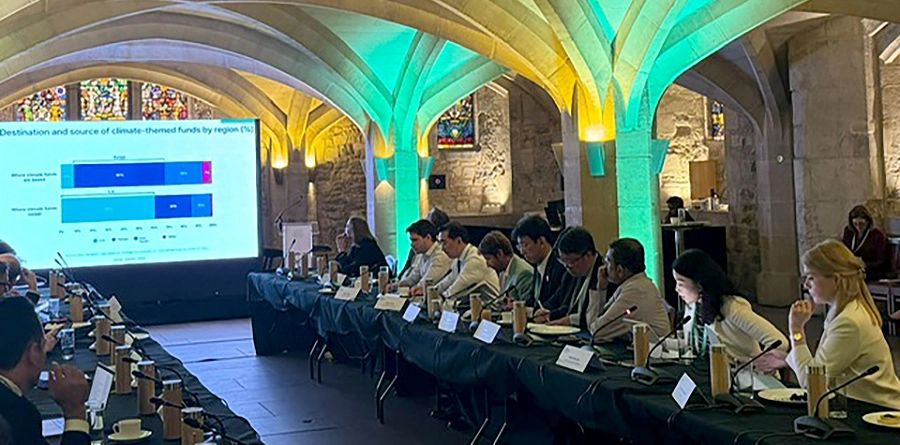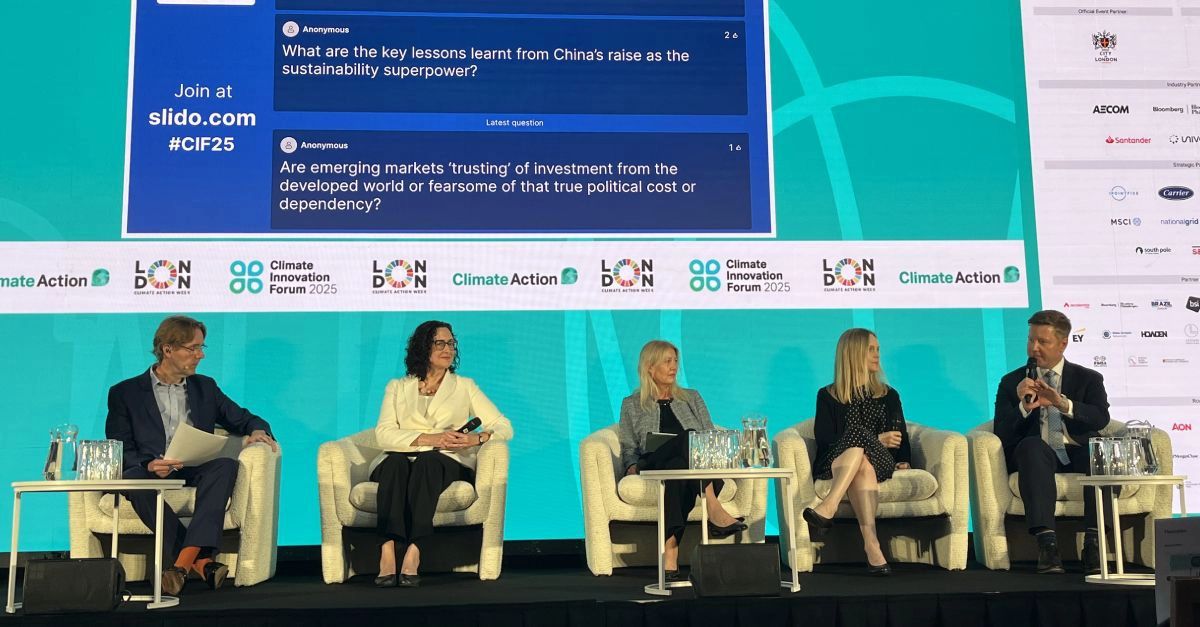London Climate Action Week: Takeaways for Investors
- Discussions stressed the need for risk-adjusted returns while financing decarbonization. Investors diverged on the impact of U.S. policy shifts but agreed that falling clean-technology costs are creating opportunities globally.
- Investors and insurers are prioritizing asset-level risk assessment and resilience strategies amid growing demand for products and solutions to help society withstand climate-driven warming as physical risks intensify.
- Carbon markets and blended finance are critical for private-sector investment in resilience and the global energy transition and are likely to feature high on the agenda at the COP30 climate summit later this year.
A finance-led transition to net-zero by 2050 may be out of reach, but innovations in measurement increasingly enable investors to deploy capital that protects against the effects of a warming world while advancing a cleaner, more resilient global economy. Those were some themes from London Climate Action Week.
My colleagues and I took part in a series of conversations covering everything from climate resilience and capital flows to carbon markets, and helped mark the launch of MSCI’s Energy Transition Framework, which is designed to help investors assess transition risk and opportunity company by company and location by location. Here are some of the takeaways from the week that stood out for us.
Discussions throughout the week focused on the physical risk of climate change and its impact on investments. Investors emphasized the rising importance of climate resilience and asset-level intelligence.
- Resilience investments will increasingly matter in the U.S., policy shifts notwithstanding, predicted one asset manager at a roundtable on climate finance hosted by the MSCI Institute under Chatham House rule. “The power lines cannot catch fire, and hence these investments will ultimately incorporate adaptation and resilience,” he said.

Leaders from finance and policy discuss climate capital in an age of fragmentation at a roundtable hosted by the MSCI Institute.
- “It’s not lost on us that when we’re investing in wind and solar we need to take into account the impact of climate change on those energy infrastructure projects,” commented Tom Woolerton, senior investment manager at Octopus Energy Generation, at a de-risking summit hosted by the insurance broker Howden, where participants stressed a need for quantifying climate-related physical risk in insurance appraisals.
- “We believe that geospatial asset intelligence is the next risk frontier,” my colleague Richard Mattison, MSCI’s head of sustainability and climate, said at a reception hosted by our firm. Investment institutions “examine risk in a systematic way but that doesn’t capture location-, jurisdiction- and postal-code-specific risks,” he observed, adding that risks from physical climate impacts, trade and tariffs, “all compound at the local level.”
Owners and managers of assets diverge in their views of the longer term significance of U.S. policy shifts but broadly agreed on the need for risk-adjusted returns even while financing decarbonization.
- “The narrative is shifting from what investors don’t own to what investors do own,” noted Amy O’Brien, global head of responsible investing at Nuveen, at the Climate Innovation Forum. “The focus needs to be on risk-adjusted returns, something we as investors have to put front and center.”
- “Many investors are running scenarios that assume a more multipolar world,” MSCI’s Mattison commented at the same forum. “Combined with trends toward onshoring and massive electrification, that means investment analysis needs to be both jurisdiction-specific and whole-economy.”

Left to right, Mark Barton, chair, Climate Innovation Forum; Amy O’Brien, global head, responsible investing, Nuveen; Stehpanie Pfiefer, CEO, IIGCC; Linda Freiner, chief sustainability officer, Zurich Insurance Group; and Richard Mattison, head of sustainability and climate, MSCI, at the Climate Innovation Forum.
- “Currently about 40% of our portfolio” is invested in the U.S. said another asset owner. “Barring a change that affects the trade relationship, we see a similar ratio even as we increase our investments in decarbonization.”
- A rapid rise in the amount of capital allocated to clean technologies in Asia reflects “a recognition that such investments are no longer seen as climate projects but just good returns,” commented one consultant.
Fragmentation and political headwinds were key topics in a panel moderated by Peter Tufano, Baker Foundation Professor at Harvard Business School, during a UN Goals House event hosted by the Harvard Salata Institute. Panelists Nili Gilbert, vice-chair of Carbon Direct; former U.K. energy minister Chris Skidmore; and David Blood of Generation Investment Management broadly agreed that, beyond the headlines, climate action continues on the ground but is not well communicated. The economic case for decarbonization needs better storytelling and fewer frameworks and acronyms, they suggested.
Conversations centered on opportunities for investment created by the need for adaptation and resilience to climate change, as well as the critical role of insurance in incentivizing such investments.
- “You have more certainty and conviction about the direction and risk of the impact of climate change over the next 15 years than you do the direction or range of interest rates, inflation, tariffs or geopolitics,” noted Jay Koh, co-founder and managing director of The Lightsmith Group and co-founder of the Global Adaptation and Resilience Investor (GARI) working group, at a roundtable on de-risking investment in climate adaptation and resilience hosted by GARI, Zurich Insurance and the advisory firm Pollination.
- “A majority of pension funds are at the beginning of the journey when it comes to adaptation and resilience,” reported Valentina Ramirez, head of climate strategy for the Institutional Investors Group on Climate Change (IIGCC), noting that IIGCC just launched a climate-resilience investment framework and a consultation on its physical climate risk appraisal methodology.
- Anjali Viswamohanan, director of policy for the Asia Investor Group on Climate Change (AIGCC), cited Asia’s vulnerability to heat stress and AIGCC’s work with the MSCI Institute to identify companies domiciled in the region whose products or solutions may help society prevent or withstand the impacts of extreme heat. “If you invest in resilience, it actually creates resilience,” she stressed.
- “The reality is that it’s quite difficult to see immediate impact from resilience measures, so we’re trying to think in terms of timing,” noted Penny Seach, chief underwriting officer at Zurich Insurance Group. “Insurers think in 12-month chunks, whereas investors think in terms of the life of an investment,” she added. “We need to change the mindset from repair and replace, which is easy for the insurance industry, to a model of predict and protect.”

Karen Ellis, chief economist, WWF-UK, discusses the focus on nature at London Climate Action Week, at a reception hosted by MSCI.
Both carbon trading and blended finance (combining government or philanthropic capital with private capital in one financing structure) as a means to attract private sector investment in the energy transition in emerging markets featured prominently in London.
The governments of Kenya, Singapore and the U.K. announced the formation of The Coalition to Grow Carbon Markets, which aims to strengthen the integrity of credits and promote their use by companies in meeting emissions targets to increase the flow of private-sector finance for climate, nature and a just transition.
- Ravi Menon, co-chair of the new coalition, Singapore’s ambassador for climate action and former director of the Monetary Authority of Singapore, stressed the value of carbon trading in climate finance in his opening remarks on the record at our Institute roundtable, calling it “key for decarbonization in the Global South.”
- “Carbon removals are generating interest from buyers,” commented a participant at our Institute’s roundtable, citing continuing purchases of removals by U.S. tech giants and the trend by governments to link voluntary and compliance markets by permitting, as Singapore does, the use of high-quality carbon credits to offset a portion of their taxable emissions.
- Blended finance plays a role in financing adaptation and resilience, emphasized Andrew Lucas, head of energy, climate and environment at the U.K. government’s Foreign, Commonwealth & Development Office at the GARI roundtable. Developing local financial centers can help to attract private-sector investment for adaptation and resilience in emerging markets by reassuring investors. “Local capital is stickier and leads to international funding,” he said.
- Outcomes of the COP30 climate summit should include an adaptation roadmap that makes private-sector investors “feel safer, whether via a high-quality carbon offset, or helping the private sector invest more in emerging markets because they can actually quantify the real risk,” suggested Rachel Kyte, the U.K. government’s special representative for climate.
Many of the issues discussed in London, including private-sector investment in the energy transition and the role of carbon trading in spurring private-sector climate finance, as well as the importance of nature-related risks are likely to be high on the agenda at the U.N. COP30 climate summit later this year.
“Mainstreaming climate in investments and insurance,” “harmonization of carbon markets and carbon accounting standards” and protecting nature with “solutions for climate, biodiversity and desertification” are among 30 objectives for the summit published by the COP30 presidency on the eve of London Climate Action Week.1
Subscribe todayto have insights delivered to your inbox.
Technology and Policy Both Temper and Drive Transition Risk
Calculating risks related to the energy transition takes more than measuring emissions and analyzing sectors. It requires examining technology and regulations, one company at a time. We explain.
Energy Transition Framework
Assess how the energy transition may impact your portfolio and see which companies are positioned to lead with MSCI’s Energy Transition Framework.
Does the Mortgage Market Price in Physical Risk?
How has increased physical risk from natural disasters affected residential mortgage and residential mortgage-backed securities? To find out, we turned to MSCI GeoSpatial Asset Intelligence.
1 “Fourth Letter from the Presidency,” COP30 Brazil Amazonia, June 20, 2025.
The content of this page is for informational purposes only and is intended for institutional professionals with the analytical resources and tools necessary to interpret any performance information. Nothing herein is intended to recommend any product, tool or service. For all references to laws, rules or regulations, please note that the information is provided “as is” and does not constitute legal advice or any binding interpretation. Any approach to comply with regulatory or policy initiatives should be discussed with your own legal counsel and/or the relevant competent authority, as needed.
